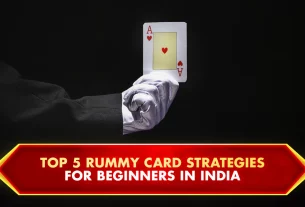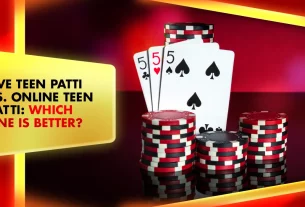Most new rummy players focus only on their own cards—trying to form sequences, sets, and use jokers wisely. But seasoned players know the real secret: paying attention to opponents is just as important as managing your hand. This skill, often called opponent tracking, separates casual participants from serious competitors at Khelraja online casino and beyond.
Opponent tracking means studying discards, predicting strategies, and adjusting your game in real time. In other words, it transforms rummy from a game of guesswork into a game of informed decision-making.
1. Reading the Discard Pile: Your Opponents’ Trail of Clues
Every card discarded in rummy tells a story. By tracking what opponents throw away, you gain insight into what they don’t need—and by extension, what they might be building.
- If someone discards multiple cards of the same suit, they’re likely not chasing a sequence there.
- If a middle card like ♦7 is discarded, it signals they aren’t focused on completing that sequence.
In casino table games, keeping mental notes of these discards can help you adjust your own priorities—for example, avoiding risky discards that could give an opponent their winning card.
2. Observing Pick-Ups from the Open Deck
Just as important as watching discards is tracking what opponents pick up.
- If an opponent takes a ♣9 from the open deck, it strongly suggests they’re forming a set or a sequence involving that card.
- Multiple pick-ups from the same suit signal a clear intent.
This allows you to calculate probabilities: if they’re collecting spades, discarding spades becomes dangerous. In online card games, where speed matters, sharp observation is your competitive weapon.
3. Identifying Opponent Playstyles
Opponent tracking isn’t just about individual moves—it’s also about recognising patterns. Over time, you’ll notice certain players lean towards particular styles:
- Aggressive players: Finish quickly, often risk discarding safe cards early.
- Defensive players: Hold onto cards longer, discard cautiously.
- Bluffers: Discard cards that mislead others into thinking they’re chasing different sequences.
Recognising these tendencies allows you to adapt. Against aggressive opponents, focus on building strong defensive plays; against defensive players, exploit their hesitation by finishing faster.
4. Tracking Opponent Tilt and Emotion
Yes, even in rummy, psychology matters. Tilt—the emotional reaction to losing—shows up in reckless discards, inconsistent play, or chasing low-probability hands.
By observing when an opponent is on tilt, you can predict riskier moves and capitalise. For example, if they suddenly start discarding high-value cards after a loss, they may be rushing to end the game. Smart players stay calm and use this to their advantage.
At Khelraja online casino, tilt-based mistakes are common in real-money rummy sessions, giving disciplined players an edge.
5. Using Opponent Tracking to Shape Your Own Discards
Tracking opponents isn’t just about observation—it’s about action. Once you know what others are chasing, you can discard strategically to block them.
For example:
- If an opponent picked up ♠9, avoid discarding ♠8 or ♠10.
- If they’re ignoring clubs entirely, discarding clubs becomes safer.
This active form of defence turns rummy into a psychological duel, where the goal isn’t just to build your hand but to deny opponents the chance to finish theirs.
6. Probability Meets Psychology: Advanced Opponent Tracking
The most advanced rummy players combine opponent tracking with probability. By estimating unseen cards and factoring in opponent habits, you can make informed predictions mid-game.
Example:
- Two opponents are discarding ♥ cards heavily.
- A third is hoarding ♥ cards, but only picking from the closed deck.
- Probability suggests that the third opponent is building a hidden ♥ sequence and avoiding giving away information.
In this case, smart play might be to prioritise completing your own sets quickly before they strike.
This is what makes rummy more intellectually challenging than many other online gambling games—you’re constantly balancing logic, observation, and psychology.
Bonus Tip: Opponent Tracking in Online vs. Live Play
- Online rummy: Tracking relies almost entirely on discards and pick-ups. Speed is critical, as moves happen quickly.
- Live table games: In addition to cards, you can observe body language, hesitation, and even sighs or smiles. These “tells” are invaluable in face-to-face sessions.
Whether you play on digital platforms or physical tables, opponent tracking is always relevant—it just takes different forms.
Why Opponent Tracking Gives You the Edge
Here’s why integrating opponent tracking into your rummy game is a game-changer:
- Better decision-making: You avoid discarding valuable cards to opponents.
- Improved probability calculations: You know which cards are still “live” in the deck.
- Psychological control: You spot tilt, hesitation, and bluff attempts.
- Defensive strength: You protect your sequences while blocking others.
It’s no surprise that seasoned players at casino table games and platforms like Khelraja online casino consistently use this skill to outlast casual participants.
How Beginners Can Start Practising Opponent Tracking
If you’re new to rummy, here’s a step-by-step way to build this habit:
- Start with discards: Focus on remembering at least the last 3–4 cards discarded.
- Notice open-deck picks: Write them down if needed during casual play.
- Look for suit patterns: Which suits are players avoiding?
- Test safe discards: Use observations to reduce risk.
- Evaluate post-game: Ask yourself what patterns you missed.
Over time, these small steps sharpen into instinct, and opponent tracking becomes second nature.
Final Thoughts
Rummy isn’t just about the cards in your hand—it’s about the cards in your opponents’ hands, too. By mastering opponent tracking, you elevate your game from chance-based to strategy-driven.
From reading discards to spotting emotional tilt, from adjusting your own discards to calculating probabilities, opponent tracking is the invisible skill that separates amateurs from experts.
So the next time you play at a live table game or log into Khelraja online casino, remember: your opponents are leaving clues everywhere. It’s up to you to track them, interpret them, and turn them into your winning edge.





